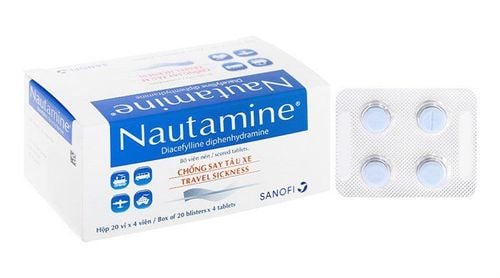This is an automatically translated article.
Vomiting is a reflex of the body to push food from the stomach to the esophagus and then out through the mouth. Vomiting and nausea make the body feel tired and uncomfortable. Use of oral antiemetics to reduce nausea, limit vomiting. It is necessary to take antiemetics at the right time to help promote the best antiemetic effect.
1. Oral antiemetics
Antiemetics come in many different forms including oral form. Some commonly used oral antiemetic drugs:
1.1 Diphenhydramine or nautamine This is an anti-nausea drug that is used quite commonly today. Diphenhydramine can be used by both adults and children. Recommended for children over 4 years old.
The drug is not suitable for pregnant and lactating women. Do not use the drug in combination with antihistamines, anticholinergics or neuroleptics.
Note with caution to patients with lower respiratory tract disorders, cardiovascular disease, hypertension, hyperthyroidism...
1.2 Domperidone The drug works to help correct digestive system dysfunctions , affects peripheral dopamine, changes the function of the gastrointestinal tract, accelerates the pushing of substances in the stomach to the intestine, dilates the pylorus after eating, and prevents gastroesophageal reflux.
With oral administration, domperidone is produced in the form of tablets or effervescent nuggets for adults, while in children the drug is available as a suspension. Use with caution in patients with a history of renal disease.
Several recent studies in patients taking domperidone have shown the drug to cause torsades de pointes. This phenomenon occurs more strongly when erythromycin is combined with clarithromycin.
1.3 Metoclopramide This is a strong antiemetic, drops for children. Metoclopramide acts directly on the emetic center in the brain, so it is indicated for severe vomiting, especially in postoperative patients who are receiving chemotherapy.
1.4 Ondansetron Antiemetic drug popular, much indicated in the case of need to prevent vomiting after surgery, or cancer treatment with chemotherapy or radiation.
The drug can be used by both the elderly and children. The drug has many side effects on the digestive, nervous and cardiovascular systems, so it should be closely monitored when using.
2. Antiemetic drugs taken before or after eating?
To have the best antiemetic effect, it is necessary to use antiemetics correctly. The time of taking antiemetic drugs is one of the important factors that directly affect the effect of the drug.
Antiemetic drugs taken before or after eating? To answer that question, experts say that in order to have a strong antiemetic effect, which can completely prevent nausea and vomiting, it is necessary to take the drug at least 30 minutes before vomiting. That is the minimum amount of time for drugs that block the receptors to produce an antiemetic response. The problem is how to know when vomiting to take medicine? In fact, depending on each case, there are different estimated time periods.
Related to eating and drinking, the nature of antiemetic drugs are drugs that regulate digestive system disorders, stimulate gastric motility, increase cardiac sphincter tone, and at the same time increase the opening amplitude of the stomach. pyloric sphincter after eating. As a result, antiemetics help relieve symptoms of indigestion, slow food down in the intestines, and reduce nausea. Taking the drug about 15 to 30 minutes before eating not only creates time for the drug to be absorbed into the bloodstream to maximize its effects, but also limits the effects of food, leading to a decrease in the effectiveness of the drug. Taking the drug after eating, sometimes the drug has not had time to take effect, the patient has nausea and vomiting. Therefore, with oral antiemetics should be taken before meals will be more effective than after meals.
Each specific patient case will have different antiemetics, specifically:
With motion sickness antiemetics: should be taken at least 30 minutes before the bus departs. Motion sickness antiemetics also come in the form of patches, but they are less effective than oral medications. Prophylaxis of nausea and vomiting in surgery, giving patients oral antiemetic drugs 1 hour after surgery. If oral antiemetics are not strong enough, additional parenteral forms should be added. One of the side effects of chemotherapy and radiation therapy is nausea, vomiting, making patients tired, difficult to eat. Antiemetics are essential in these patients. It is recommended to take antiemetics 1 hour before starting treatment. Consider taking a second dose about 1 to 2 hours after treatment depending on the patient's health and vomiting level. In case the patient has food poisoning, food poisoning, let the patient vomit. Vomiting will help the patient eliminate toxins from the body in the most natural way. Taking antiemetics early will cause toxins to be retained in the stomach, increasing poisoning. Only use antiemetics when pathogens and toxins have been eliminated. Thanks to its convenience and high efficiency, oral antiemetics are being used quite a lot. Please contact specialist doctors for advice on suitable antiemetic drugs and how to use them for good health while minimizing side effects.
Please dial HOTLINE for more information or register for an appointment HERE. Download MyVinmec app to make appointments faster and to manage your bookings easily.













